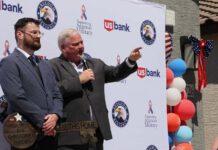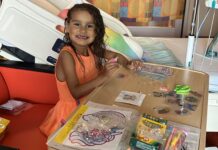
Richard Joaquin was born in 1946 into the Gila River Indian Community, one of four federally recognized tribes of the Tohono O’odham Indian Community (Salt River, Ak-Chin and the Tohono O’odham Nation are the other three.) At one time, the Tohono O’odham community covered a large portion of the southwestern region of the United States and northern parts of Mexico.
Joaquin distinctly remembers when he moved to the Ak-Chin reservation.
“It was Sept. 3, 1961,” Joaquin says. “I always remember that date and I don’t know why. But I moved here to work on the farms. I didn’t enjoy school very much and wanted to work with my hands in the fields.”
It was among the fields and with the other men of the tribe he began to learn more about his culture. They would talk, and he would listen. They would camp out by the corrals, near old burial grounds. Under the stars, the elders would talk about their ways.
He went to a Catholic school growing up on the Gila River reservation where only English could be spoken. Though he speaks his native tongue, he acknowledges the effect on later generations to speak only English.
“I believe that was really the first cut to our ancestors,” Joaquin says. “When we began to lose our language, we began to lose our culture.”
Part of the culture is desert lore — the medicine man is supposed to have special powers that can see into a spiritual universe. Joaquin says it was very much a part of Tohono O’odham life, but over the years, Western society and medicine have taken on a much bigger and dominating role in the community.
Joaquin can only think of a dozen or so medicine men and women who are still around. Yet, they are still called upon for ceremonies that the outside world is not allowed to see, and they still practice the gift of healing given to them by their ancestors and from the creator, I’itoi.
I’itoi means “man in the maze” and the intricate designs often seen in traditional Tohono O’odham basket weaving and pottery is a tribute to the creator and the Tohono O’odham way of life.
Joaquin’s ability in becoming a medicine man was not taught to him by someone else. He says individuals are chosen by their ancestors and I’itoi. Through visions and their own understanding, medicine men receive their knowledge of herbs, remedies and healing powers.
“It’s a gift to a certain person in a role they are to take,” Joaquin says. “They slowly start doing what the gifts are and only those individuals will know. No one else will be able to learn them and each medicine man is different.”
Stories, ceremonies and secrets
Joaquin says there are different levels of spiritual awareness for a medicine man. Like the gift itself, a medicine man cannot learn his place in life, only accept it. The levels vary in their understanding and gift of healing, and in the past, he has known of medicine men who have had great healing powers.
“My brother-in-law had a broken leg and he went to go see this medicine man that was said to fix broken bones,” Joaquin says.
The medicine man began a process of praying while feeling the leg with his hands and moving his feathers back and forth over the leg. Joaquin says his brother-in-law’s leg was healed and the only advice the medicine man gave his brother-in-law was to “take it easy.”
That happened in the 1970s, and Joaquin says he hasn’t heard of any medicine man having that power since.
Joaquin also talks about his uncle, who had been diagnosed with diabetes and went to a medicine man.
“The medicine man told him about a plant he would find near Tucson,” Joaquin says. “He says ‘go over there, you’ll find it and it will help you.’”

![Maricopa’s ‘TikTok Rizz Party,’ explained One of several flyers for a "TikTok rizz party" is taped to a door in the Maricopa Business Center along Honeycutt Road on April 23, 2024. [Monica D. Spencer]](https://www.inmaricopa.com/wp-content/uploads/2024/04/spencer-042324-tiktok-rizz-party-flyer-web-218x150.jpg)



![Locals find zen with Earth Day drum circle Lizz Fiedorczyk instructs a drum circle at Maricopa Community Center April 22, 2024. [Brian Petersheim Jr.]](https://www.inmaricopa.com/wp-content/uploads/2024/04/PJ_3922-Enhanced-NR-218x150.jpg)


![Shred-A-Thon to take place tomorrow An image of shredded paper. [Pixabay]](https://www.inmaricopa.com/wp-content/uploads/2024/03/shredded-paper-168650_1280-218x150.jpg)



![Alleged car thief released without charges Phoenix police stop a stolen vehicle on April 20, 2024. [Facebook]](https://www.inmaricopa.com/wp-content/uploads/2024/04/IMG_5040-218x150.jpg)



